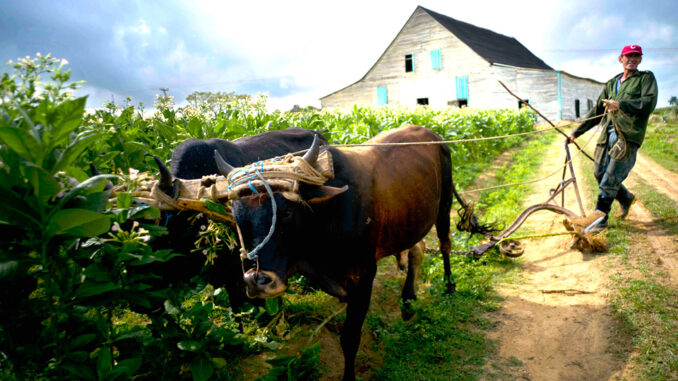
Leading Degrowthers point to Cuba, but what should we learn from her example?
David Schwartzman
Cuba is again in the news. First we read of the recent vote in the UN General Assembly, with only the U.S. and Israel voting no (184 yes votes) to a rejection of the U.S. embargo against Cuba for the 29th consecutive year (https://news.un.org/en/story/2021/06/1094612), and now for street demonstrations in Cuban cities protesting economic conditions and calling for “democracy”, with the U.S. imperialists very likely in play utilizing these conditions in its regime change agenda. Despite promises made in the 2020 campaign, the Biden administration has yet to return to Obama’s normalization policies, while vital medical supplies are in short supply like syringes needed for COVID vaccination (HTTPS://GHPARTNERS.ORG/SYRINGES4CUBA/).
So let’s see how prominent degrowthers point positively to Cuba’s example, but first some background on their core argument. Mastini, Kallis and Hickel are co-authors on the subject of the GND in this posted article from the end of 2020, “For the Green New Deal to Work, It Has to Reject “Growth” (https://inthesetimes.com/article/green-new-deal-decarbonization-economic-growth-climate-activists-climate-change). I applaud their argument that “unfettered GDP growth makes it impossible to achieve the objectives of the Green New Deal”. But what should grow and what should degrow? The following is instructive:
‘The history of discussing growth from a socio-ecological point of view goes back at least 30 years. Walter Hollitscher, an Austrian materialist philosopher maintained, in discussions occurring in the late 1970s, that the only thing which should definitely grow is the satisfaction of needs. Basically, from a socio-ecological point of view the question of growth or de-growth is simple: there cannot be a yes or no answer. Some flows, stock, and activities should grow; others should not grow but decrease, for example, the production of weapons. It does not seem useful to use “de-growth” without indicating what should decrease, because the general use of the notion “de-growth” easily can easily also be understood as an undifferentiated attack on the standard of living and livelihood of many groups of people, especially broad low-income sectors of society.’ (p.33-34, Baum, 2011)
So growth that meets human and nature’s needs is needed, e.g., growth of agro-ecologies replacing industrial/GMO agriculture (like Max Ajl strongly supports) and wind/solar energy capacity.
And note while Mastini, Kallis and Hickel’s article wisely argues for reducing energy consumption in energy wasteful U.S., in a transition to renewables, it goes on to claim that globally energy use should go down 40% over the coming decades, reinforcing my conclusion that this is a prescription for mass suicide for most of humanity.
Further, they give an example of Cuba, where people do well with much lower energy consumption than the U.S. In an otherwise very welcome contribution calling for the global North’s responsibility to pay the climate debt to the global South, along with “green anti-imperialism”, Max Ajl (2021) unfortunately relies on degrowth pessimists instead of state-of-the-science research regarding the potential for a robust renewable energy transition especially for the global South. Following the discourse of degrowthers, Ajl points to Cuba’s example as an energy level goal for the global South (p.71).
But Cuba, in spite of her world standard health and education system and being on the cutting edge of ecosocialist development, suffers from energy poverty which translates into a life expectancy virtually tied with the U.S. (1). Of course, in the case of Cuba we know that the U.S. embargo is by far the main cause, driving this state of energy poverty. Cuba falls well below the minimum energy consumption per capita required for the highest world standard life expectancy (e.g.Japan is close to the minimum) (Schwartzman and Schwartzman, 2019). Their consistent advocacy for the goal of a “satisfactory” quality of life for most of humanity living in the global South smells for me like another Eurocentrist fart from the degrowthers.
References cited
Ajl, Max. 2021. A People’s Green New Deal. London: Pluto Press.
Baum, Josef. 2011. ‘In Search for a (New) Compass –How to Measure Social Progress, Wealth and Sustainability?’ in: The Left Between Growth and De-Growth Discussion Papers, Edited and introduced by Teppo Eskelinen, pp. 33-45, ‘Transform! European journal for alternative thinking and political dialogue,’ Hamburg).
Schwartzman, P., Schwartzman, D. 2019. The Earth is Not for Sale: A Path Out of FossilCapitalism to the Other World That is Still Possible. Singapore: World Scientific.
Footnote
(1) https://en.wikipedia.org/wiki/List_of_countries_by_life_expectancy
World Health Organization December 2020 (data from 2019)
Rank
40 United States 78.5 years
46 Cuba 77.6 years
Cuba’s current life expectancy is very likely equal to or greater than the U.S. as result of the COVID pandemic with the U.S. death rate nearly 20 times that of Cuba:
https://coronavirus.jhu.edu/data/mortality
Deaths/100K Population
U.S. 183.32
Cuba 10.13
On the other hand Cuba does better than the U.S. in the following health measures:
https://en.wikipedia.org/wiki/List_of_countries_by_infant_and_under-five_mortality_rates
Infant mortality (deaths/1000 live births)
CIA 2020 estimates
Cuba 4.3
United States 5.3
Under-five mortality (deaths/1,000 live births) – 2019 estimates.
World Bank
Cuba 5.1
United States 6.5

FROM DAVID SCHWARTZMAN:
Update: while the ratio of the U.S. to Cuba death rate from COVID has dropped to 3.62 as of today, September 13, 2021 (https://coronavirus.jhu.edu/data/mortality) my conclusion regarding comparative life expectancies is probably still valid. The continuing U.S. embargo/sanctions regime imposed on Cuba has strongly contributed to this rising COVID death rate.